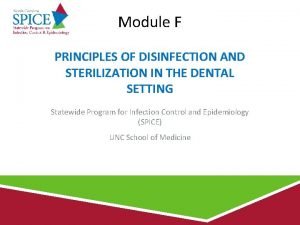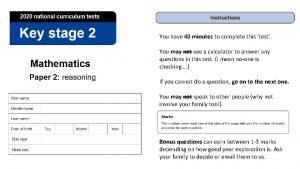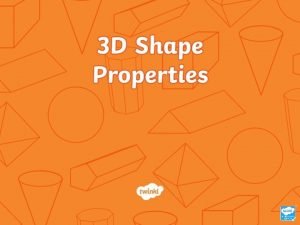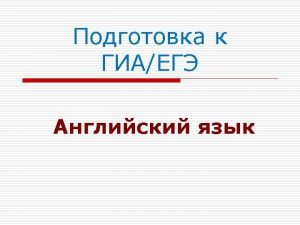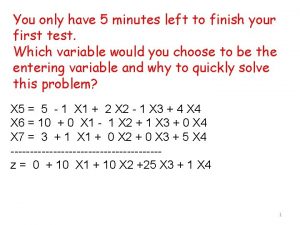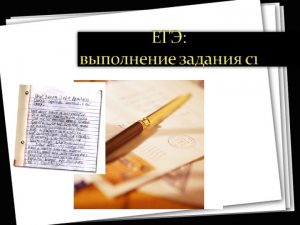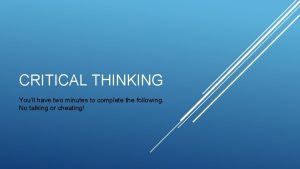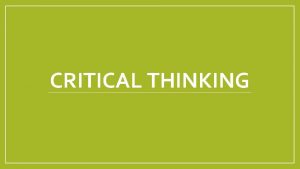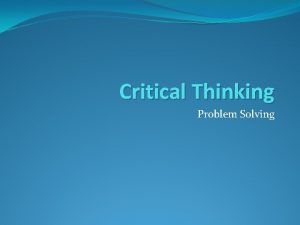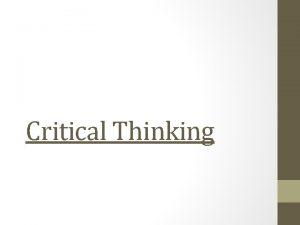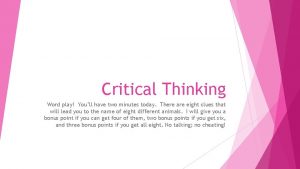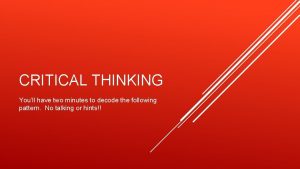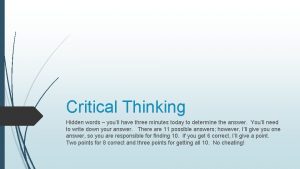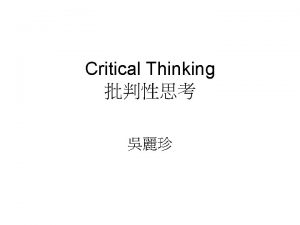Critical Thinking YOULL HAVE 3 MINUTES TO COMPLETE










- Slides: 10

Critical Thinking YOU’LL HAVE 3 MINUTES TO COMPLETE THE FOLLOWING. NO TALKING; NO CHEATING!

The Question A man worked for a high-security institution, and one day he went in to work only to find that he could not log in to his computer terminal. His password wouldn't work. Then he remembered that the passwords are reset every month for security purposes. So he went to his boss and they had this conversation: Man-"Hey boss, my password is out of date. " Boss-"Yes, that's right. The password is different, but if you listen carefully you should be able to figure out the new one: It has the same amount of letters as your old password, but only four of the letters are the same. " Man: "Thanks boss. " With that, he went and correctly logged into his station. What was the new password? BONUS: What was his old password?

The Solution The old one was : Out of date The new one is: Different He said: My password is "Out of date. " And the boss told him the new one when he said: "The password is different. “ The four letters D, F, E, and T are in common.

Goals for the Day I can identify the basic components of a synthesis essay.

Rhetorical Analysis Questions?

Basic Argumentative Terms Thesis – The main claim or main idea of the entire argument (essay). Claim – a statement that is arguable. Evidence – support for a claim. Counterclaim – an opposing claim or viewpoint. Refute/refutation/rebuttal – a response/objection to the counterclaim Concession – the acknowledgement that an opposing view may be true or reasonable (will generally be followed by refutation which challenges the validity of the opposing argument). Warrant (assumption) – the assumption necessarily shared by the speaker and audience. Qualifier – tempers that claim by making it less absolute (usually, probably, maybe, in most cases, likely). Argument – the process of reasoned inquiry; a discourse resulting in a coherent and considered movement from claim to a conclusion.

Synthesis Essay Quick Overview Argumentative Essay - Evidence with C. H. O. R. E. S.

Examining a Synthesis Prompt Begin by simply reading the prompt. What are you asked to do? What are your initial feelings, thoughts, or stances on the issue at hand? Read through the texts. Mark each text and determine the stance the writer takes on the issue What do you agree with (mark it!) and what do you disagree with (mark it!) Plan Skeleton outline – how will you develop your own argument What evidence will you use, what are the counterarguments and how will you rebut? Synthesize Write an essay in which you incorporate yourself into the broader conversation.

Open Google Classroom to the Synthesis Essay Can you identify a clear thesis? How does the writer introduce that topic? What is the specific evidence? How is the evidence presented? What concessions are made? Why? How does the author help maintain an open dialogue? What transitional words or phrases are used to help guide the reader? How does the author control the language?

Homework 1. Review anything that might help you with your final exam. • Rhetorical Analysis Outline – on colored paper (pink/blue maybe? ) • Review prompts – rhetorical/synthesis • Look back over AP MC question types • Consider various ways of analyzing a text – annotation, asking ? s, etc. • Rhetorical device log • Academic vocabulary • Skim the first 3 -4 chapters of the book
 Critical semi critical and non critical instruments
Critical semi critical and non critical instruments Principle of sterilization
Principle of sterilization Perbedaan critical thinking dan creative thinking
Perbedaan critical thinking dan creative thinking You will have 40 minutes to complete the test.
You will have 40 minutes to complete the test. 60 minutes = 1 hour
60 minutes = 1 hour 8 vertices 12 edges 6 rectangular faces
8 vertices 12 edges 6 rectangular faces You have 30 minutes to do this task
You have 30 minutes to do this task You have 30 minutes to do this task
You have 30 minutes to do this task We have 5 minutes left
We have 5 minutes left You have 20 minutes to do this task
You have 20 minutes to do this task You have 20 minutes to do this task
You have 20 minutes to do this task

